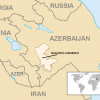Stories about Azerbaijan from February, 2010
Azerbaijan: Water Tuesday
As was the case last year, Sheki, Azerbaijan introduces its readers to the start of events leading to the holiday of Novruz with Water Tuesday. The blog also says that February is considered the toughest month of Winter, but says that it also marks the beginning of Spring.
Azerbaijan: Khojali anniversary
Sheki, Azerbaijan marks the anniversary of a massacre taking place during the conflict between Armenia and Azerbaijan over the disputed territory of Nagorno Karabakh. The blog laments the loss of life during war and hopes that the victims rest in peace.
Azerbaijan: Oil Academy corruption allegations
ANTV, a citizen journalism site recently awarded for its contribution to freedom of the press in Azerbaijan, posts a YouTube video [AZ/EN] interview with Elmin Badalaov, a fourth year student at Baku's Oil Academy expelled allegedly because of his investigation into corruption at the prestigious institute.
Azerbaijan: Scary Azeri turns 1
To mark its first birthday, Scary Azeri in Suburbs posts an illustration to celebrate the occasion.
Azerbaijan: ANTV receives freedom of the press award
ANTV [AZ/EN/RU], an online citizen journalism site co-founded by now imprisoned video blogging youth activist Emin Milli, has received an award from ZEIT-Stiftung for its work in promoting independent voices and alternative news and views in Azerbaijan [RU]. The Institute for Reporters Freedom and Safety (IRFS) also carries the news...
Caucasus: Lezginka dance
Orxanbey posts a video on YouTube of what is described as an Azeri guy and and an Armenian girl dancing to the Lezginka (national dance popular in the North Caucasus), location unknown. Wearing the national flags of Armenia and Azerbaijan, Because of the still unresolved conflict between the two countries...
Azerbaijan: Healthcare
Emotions on Air, Mind Mute comments on healthcare in the oil-rich republic. Despite legislation guaranteeing access for all, the blog says, the situation is far from perfect and especially when it comes to bone marrow donors.
Azerbaijan: Almost a year old…
Scary Azeri in Suburbs approaches it's first birthday, but wonders why most search engine referrals come from queries on sex and prostitution.
Azerbaijan: In this part of the world
Flying Carpets and Broken Pipelines comments on the lack of democracy in the Caucasus in general. However, the blog says, some progressive youth are struggling to effect change and are the key to the future as they are the future.
Azerbaijan: Breaking down stereotypes
Flying Carpets and Broken Pipelines blogger Arzu Geybullayeva comments on her audio interview conducted over Skype with Global Voices Online's Caucasus editor for Transitions Online. The blog says that communication is possible, living together is possible, breaking down existing barriers is possible and [that] this a message [it] would give...
Azerbaijan: Urban development
Flying Carpets and Broken Pipelines comments on the continuing construction boom in Baku, Azerbaijan. The blog says that new urban development in the city is haphazard and is starting to adversely affect the old part of the city, a UNESCO World Heritage site.
Georgia: Friends of Freedom for Peace
MrAshn [AZ] posts a video of members of the Azerbaijani Dalga Youth Movement with Armenian support holding a small flash mob in Tbilisi, Georgia, to mark their fifth anniversary and call for peace in the South Caucasus. The region has been riven by ethnic conflict, especially between Armenia and Azerbaijan....
Azerbaijan: Interview with Feride Sadikhova Buyuran
Women's Forum interviews culinary blogger Feride Sadikhova Buyuran while her AZ Cookbook posts a recipe for lemon upside down cake.
Azerbaijan: Book review
Scary Azeri in Suburbs comments on Artush and Zaur, a homo-erotic novel telling the love story between an Armenian and Azerbaijani man. The blogger says that while the book is a brave attempt to overcome taboos, she found it more funny than touching in its depiction of various sexual encounters.
Armenia-Azerbaijan: Twitter Diplomacy
With a peaceful resolution to the conflict over Nagorno Karabakh as elusive as ever, Armenians and Azerbaijanis are unable to visit each other’s country or communicate through traditional means such as telephone or mail. Can new and social media step in to fill the gap to break the information blockade?

